Africa enters 2022 with a long and urgent to-do list. Below, experts outline key political, economic, security and health issues the continent must contend with as it maps its COVID-19 recovery and post-pandemic reality.
Elections and Governance
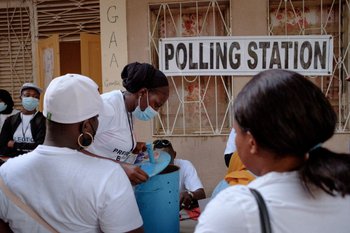
Eighteen African countries are slated to hold elections of one sort or another this year, in what will undoubtedly be a measure of the continent’s commitment to democratic governance. Some elections to watch keenly include Angola, Kenya, Libya and Senegal. States such as Chad, Guinea, Mali and Sudan are still dealing with the aftermath of coups d’état that occurred in the last 18 months. These messy takeovers have fuelled instability in the Maghreb, East Africa and the Horn. The African Union and the Economic Community of West African States (ECOWAS) are pushing for military leaders in these states to commit to civilian transitions by holding elections this year.
The Southern African Development Community (SADC) recently intervened in eSwatini to establish and oversee a national dialogue process after months of violent clashes between pro-democracy protestors and security forces. It will be important to watch how this unfolds in the coming months, and whether long-standing demands from opposition groups and activists for wider democratic reforms in Africa’s last absolute monarchy will be met.
The African Peer Review Mechanism – a continental good governance monitoring and promotion tool – is striving for universal accession by 2023. Currently, 41 of Africa’s 55 states are voluntary members.
– Steven Gruzd, Head of the African Governance and Diplomacy Programme, South African Institute of International Affairs (SAIIA)
Trade
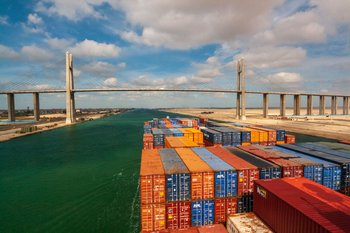
Africa remains underrepresented in global trade, accounting for 2.19% of global exports and 2.85% of global imports in 2020. The African Continental Free Trade Area (AfCFTA) can reverse this trend if it is effectively implemented. Launched in January 2021, the agreement is a crucial step towards boosting regional trade and economic development, but full trading activity is yet to commence due to ongoing negotiations on various protocols.
Concluding negotiations on the agreement on rules of origin (the “legal provisions used to determine the nationality of a product in the context of international trade”) and protocols on trade in e-commence and services is a priority. While these are unavoidably complex, the strain on economic growth due to COVID-19 necessitates the acceleration of the AfCFTA.
The newly launched Pan-African Payment and Settlement System (PAPSS) holds potential: the platform, developed by Afreximbank and the AfCFTA Secretariat, is expected to bolster intra-African trade by facilitating simpler and secure cross-border payments and reducing payment transaction costs by $5 billion annually. The African Trade Gateway, AfCFTA Adjustment Facility and Trade Finance Facility are also expected to take off, making 2022 a promising year for the effective operation and success of regional economic initiatives. However, it will take much longer for the continent to fully recover from the economic shocks of the pandemic.
– Adedeji Adeniran, Director of Education and Governance Research and Senior Research Fellow, Center for the Study of Economies of Africa (CSEA).
Digital economies

Whether 2022 will be a year of recovery or of continued crisis management, the construction and strengthening of African digital economies remains a critical policy priority for the continent. The COVID-19 pandemic has accelerated digital transformation in many parts of the world, both increasing the utility of Internet access and underlining the apparent promise of digital economies. But the pandemic has also led to compelling insights into growing inequalities on the continent, leading to the need for greater efforts to help reduce divides within and across digital economies in Africa and the world.
From a policy priority perspective, African policymakers must address and mitigate the risks that accompany the continent’s increased reliance on global digital economies this year. This includes finding better ways to expand African telecoms infrastructure and connect Africa’s unconnected, but also the need to address the countervailing costly impacts of disconnecting parts of it through Internet shutdowns or oft misguided attempts to tax digital services.
While more supportive data governance frameworks (e.g., data protection laws and cybersecurity strategies) and better resourced institutions (e.g., information regulators) are needed at local levels, cross-border coordination is crucial to address global risks. New and existing continental policy efforts relevant to digital economies will therefore be particularly important this year. While progress towards the ratification of the African Union’s Convention on Cyber Security and Personal Data Protection (known as the Malabo Convention) has been slow, there has been talk of the need for a Malabo 2.0. The AU’s ongoing efforts to develop a comprehensive data governance policy framework might be more fruitful this year; as will ongoing efforts to implement the Africa Continental Free Trade Area (AfCFTA), which should facilitate easier continental trading.
– Anri van der Spuy, senior research associate, Research ICT Africa
Security
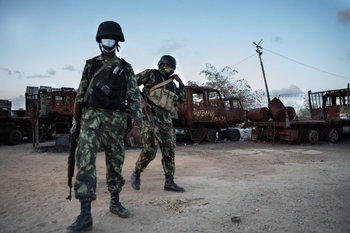
Intra-state conflict, terrorism, and unconstitutional changes of government are three of the biggest security issues in Africa to monitor in 2022. These are ongoing concerns, and the continental response (especially that of the AU Peace and Security Council (PSC)) to these threats will be closely observed. Deeper underlying governance issues are often at the heart of these events, and it is important that this link is made. Countries to watch following military coups in 2021 include Mali, Sudan and Guinea. Chad is also of interest following a military government takeover after the death of president Idriss Déby in April last year. The PSC approved an 18-month plan to return the country to civilian rule; it will be important to monitor its implementation. Ethiopia, where intra-state conflict is threatening regional stability, also remains on the watchlist this year.
In Mozambique, a regional military operation has been launched to help fight terrorism in the Cabo Delgado province. Terrorism and violent extremism also threaten stability in other regions. West Africa, the Lake Chad Basin region (Boko Haram is especially active here), the Horn of Africa, the Sahel, and East Africa are all at risk. Counter-terrorism efforts will require greater attention to defence spending and improved utilisation of continental early warning systems. The APRM is one such tool. Rising extremism is often linked to poverty, unemployment, and other underlying governance issues. Counter-terrorism therefore also requires that governments address socio-economic development issues.
– Isabel Bosman, researcher, South African Institute of International Affairs
Ethiopia’s Tigray conflict
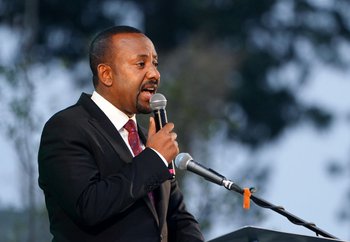
Resolving the deadlock between the Ethiopian government and the Tigray People’s Liberation Front (TPLF) remains a key priority in 2022. Steps from the opposing parties towards brokering peace are encouraging, but it is fair to argue that the situation remains precarious and the possibility of an all-out war cannot be dismissed. The TPLF and the Oromo Liberation Army (OLA) remain on Ethiopia’s list of terrorist organisations, and the unmitigated humanitarian crisis resulting from the war shows no sign of relenting. The potential consequences of long-term conflict on the wider Horn of Africa region – ranging from security threats to a refugee crisis – loom large.
Washington’s removal of Ethiopia from the duty-free trading regime provided under the U.S. African Growth and Opportunity Act (AGOA) due to alleged human rights violations in the Tigray region came into effect on January 2nd, a move that will no doubt exacerbate the country’s economic woes.
Durable peace and stability in Ethiopia must be an imperative for all parties concerned. The central government and rebel groups will need to show desire for a continued de-escalation and peaceful dialogue. The AU’s mediation process in Ethiopia deserves unwavering support from the international community, specifically the United States, the European Union and the UN. China, the top foreign direct investor in Ethiopia, has announced that it will appoint a special envoy for the Horn of Africa region. Whether this signals its involvement in mediation attempts is unclear – China has often posited that “African problems require African solutions” and has maintained its claim of “non-interference” in Ethiopia.
– Mohamed Mahad Darar, academic focused on the Middle East and East Africa
Climate change
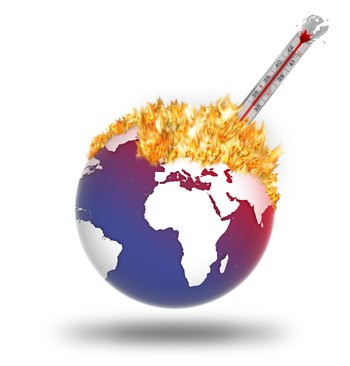
Global efforts to address climate change continue to fall short of what is required to keep the Paris Agreement temperature goal well below 1.5 degrees Celsius. Last year’s global climate negotiations (COP26) resulted in some gains, for example around financing for adaptation and curbing deforestation. Also significant was the $8.5 billion deal announced to support a just transition in South Africa. Yet commitments to curb greenhouse gas emissions remain insufficient, as do financing commitments to help developing countries to adapt to climate change.
Egypt will host COP27 this year. Billed as the ‘Africa COP’, the region will be seeking opportunities throughout the year to secure meaningful commitments to its agenda. Africa has long been clear about its climate priorities – the region needs financing to support adaptation, as well as technology transfer and other forms of support. Africa is acutely aware of the need for climate action, but such action should also support the region’s development and industrialisation ambitions. That will require skills and capacity development, green jobs and investment. In 2022 Africa will be pushing for concrete action and more ambitious commitments around climate finance, the just transition, supporting enhanced energy access and a ‘green recovery’ as the region grapples with the social and economic fallout of the COVID-19 pandemic.
– Alex Benkenstein, Head of the Governance of Africa’s Resources Programme, South African Institute of International Affairs (SAIIA)
Migration
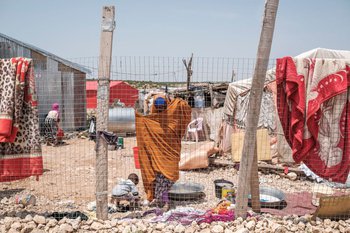
Increasing forced migration trends, climate induced migration and the impact of COVID-19 on mobility remain key African migration issues to watch in 2022. According to a forthcoming International Organization for Migration (IOM)’s Displacement Tracking Matrix (DTM) publication, East Africa and the Horn of Africa saw 3.4 million more forced migrants in 2021 – a 34% increase from 2020, mostly due to increase in internal displacement. Increased conflict together with climate-induced disasters across the continent could drive many more Africans to migrate in 2022. Climate-induced migration will continue to be a top issue this year, with the Horn of Africa experiencing one of the most severe drought situations in years, including flooding in South Sudan.
With only 10.41% of Africans being fully vaccinated against COVID-19 and limited state capacity to facilitate human mobility in the context of pandemics, the migration–health nexus will remain another key agenda item. All of these factors will exacerbate existing poor socio-economic conditions on the continent, and could potentially jeopardise and delay the planned expansion of the free movement of persons regime/s.
– Tsion Tadesse Abebe, Senior Policy and Research Officer, Regional Office for East and Horn of Africa, International Organization for Migration (IOM)
China-Africa relations
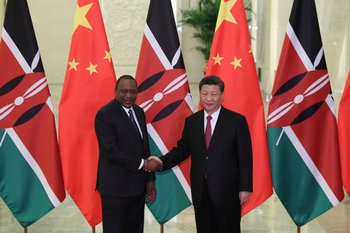
The trajectory of Africa-China relations for the next decade was set by the Forum on China-Africa Cooperation (FOCAC) Ministerial Meeting last November, where the Dakar Action Plan and the FOCAC China-Africa Vision 2035 were adopted. These commitments point to strengthening China-Africa co-operation on existing key areas like investment and peace and security, while sharply increasing imports from Africa. I expect 2022 will see measures to boost especially agricultural imports from the continent.
On the political side, China is gearing up for its next Communist Party Congress scheduled for the second half of 2022. It is widely expected that President Xi Jinping will officially enter his third term, following the 2018 decision to abolish term limits. This is a significant departure from precedents set and will signal the start of a new era. His new cabinet appointments will give clues to China’s future relationship with the Global South, where we’ll likely see greater political and technological cooperation, even as China pulls back on infrastructure funding.
In Kenya, the country’s steep debt to China is expected to be a hot election issue. The Uhuru Kenyatta government refuses to disclose the details of a multi-billion dollar rail contract with China, amid widespread perceptions of corruption. Kenya’s elections in August could reveal popular reactions to both the debt and corruption issues.
– Cobus van Staden, senior researcher in the Foreign Policy Programme, South African Institute of International Affairs
COVID-19 recovery

Just over 10% of Africans — in a continent of 1.3 billion people — are fully vaccinated against COVID-19. Challenges ranging from the supply and delivery of vaccines to the shortage of medical staff, vaccine hesitancy and low health systems capacity impede the continent’s ability to tackle not only the current health crisis but future ones.
To address this, African states must prioritise the following in 2022:
Healthcare infrastructure support: building resilient health systems to respond to the pandemic includes motivating healthcare workers with financial and non-financial incentives, particularly skills acquisition, infection prevention and control (IPC) training and access to physical and mental health services. States must prioritise funding public health facilities through establishing partnerships with private actors within the region to improve health service delivery and boost health systems financing. To tackle vaccine hesitancy, they should focus on culturally appropriate messaging to educate citizens and dispel myths around COVID-19 vaccines. Vaccination sites could serve as resource centers or hubs in partnership with community- and faith-based organisations to provide holistic support.
Strengthening the supply chain: Addressing gaps in the logistics systems, especially cold-chain refrigeration required to store vaccines, is critical to each country’s vaccination drive. A rollout strategy that addresses the challenges around last-mile delivery and ensures collaboration with local communities, health authorities in the distribution process must be implemented.
Women’s protection and development: We know that the pandemic has derailed decades of progress in women’s health and education in sub-Saharan Africa, with a devastating impact on economic development and gender equality. Countries must ensure investments in women and girls that are evidence-based, through supporting business and soft skills training for female entrepreneurs and improving access to critical resources to protect women’s lives and livelihoods. Research from the UN shows that gender-based violence has intensified since the start of the pandemic: investing in GBV prevention is crucial, and governments must also ensure that health workers are equipped to provide survivors with adequate care.
– Chioma Okafor, global health and development practitioner
(Main image: Getty)


